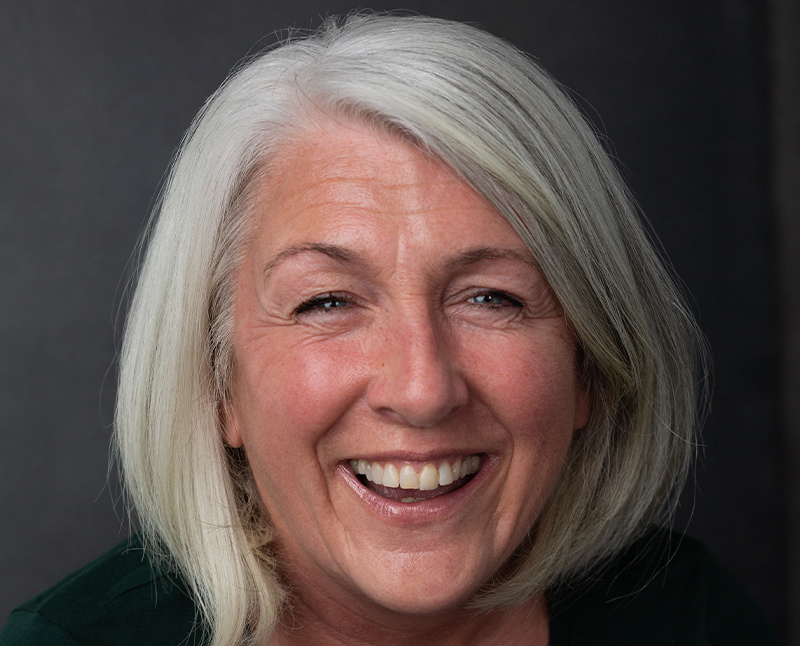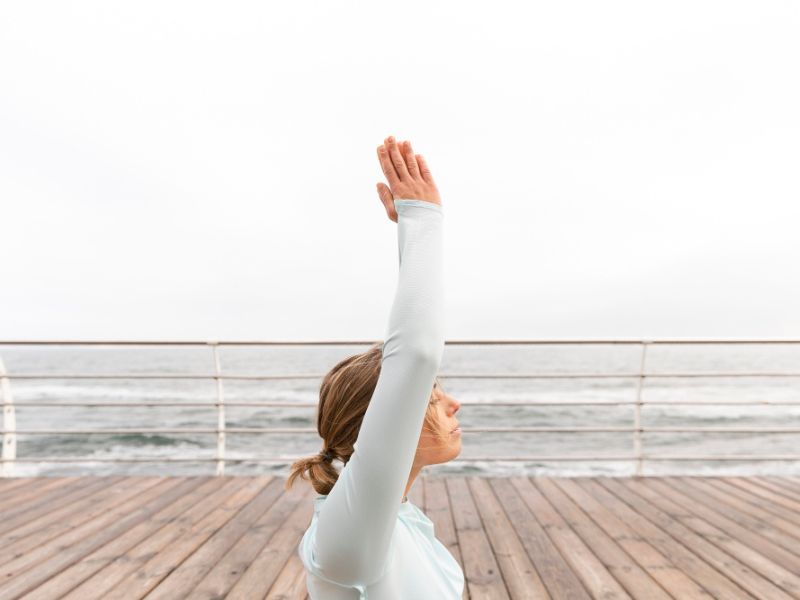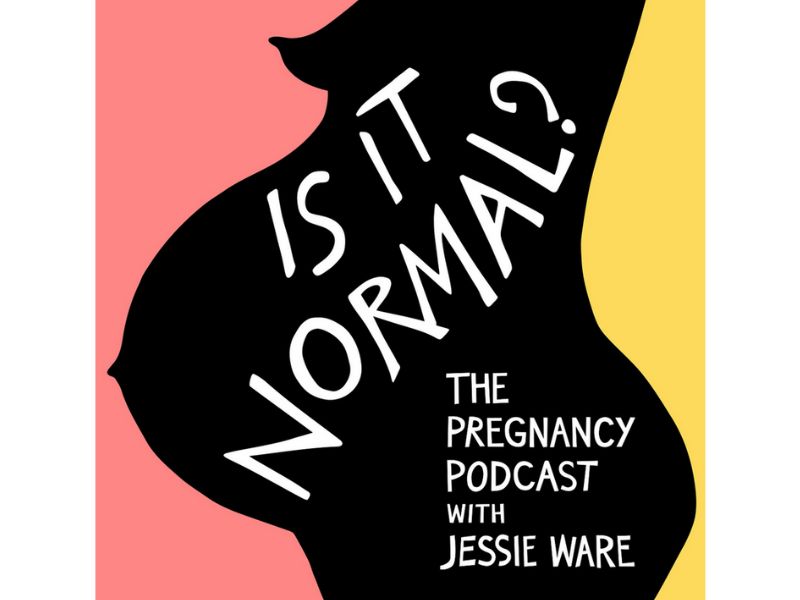Can you share a bit about your journey into comedy and what inspired you to tackle the topic of menopause?
We had a mobile bar company at the time, where we received a request from the EastEnders production team to install a beer keg on set. I was so excited and I think it was that moment that motivated me at the age of forty-six to revisit a childhood ambition of acting. Someone said you should try comedy. As a somewhat prudish pub landlady for most of my working life, I always had a character in my mind that wouldn’t scarper when any sexual banter erupted in the bar. A woman, who would call it on with no fear. Dolly Slatemen, my alter ego. Also, a pub landlady with a bit more Bet Lynch/Kat Slater presence started to take shape in a Funny Women workshop. I found she could express the things I didn’t talk about. After doing stand-up for a couple of years and a one-woman show called Red Hat No Nickers (Dolly’s autobiography) I was getting menopause symptoms, and it seemed the most natural step for me to write a show about it. At this time of my life, I had so many ambitions, I was shocked how my menopause had the power to suspend them. Researching the menopause became my hobby. I looked everywhere for inspiration. The only show I could find was Menopause the Musical which was entertaining, but I didn’t learn anything about what was happening in my body. It also became clear the lack of any menopause information in any form, anywhere. My focus was to write and perform something engaging and educational so that others were far more prepared than me for this stage of their life.
How do you approach the unique challenges and sensitivities of discussing menopause in your comedy routines?
When writing material about menopause I consider facts and thread them through the world of Dolly, where there is no filter or taboos. Dolly looks for camaraderie in all women and men for that matter, to acknowledge the existence of menopause and its connotations. Her aim is not to single out any one individual. She does this by saying the things that are said quietly, and out loud. The humour is in Dolly’s viewpoint of the world and how she articulates her own life experience, which many audiences relate to whilst maintaining a level of privacy. Dolly’s alter egos, Doctor Meena Poors and Judge Mental explore medical and legal realities a woman may endure. There is a need to highlight sensitivities around the menopause without undermining them. We are still not fully educated in the school system about this subject and GPs are struggling to catch up with millions of women who want further information. If you can be assured about menopause symptoms when you least expect it, I believe it helps when it happens. I often think If any woman gets to menopause without knowing what it’s about, then how far have women truly come?
When we laugh, a little door in our mind opens and we allow information to be taken on board we wouldn’t normally give access too. Comedy enables an audience to laugh out loud about taboos and once we laugh the taboo starts to lose authority.
What kind of research or personal experiences do you draw upon when crafting material related to menopause?
I worked with Leicester University in the early days of the show, here I was able to join workshops involving women from different cultures and we would discuss the menopause and the character of Dolly. It was so enlightening to hear how they identified with her as well as comparable characters in their own communities. I also learnt about similarities and differences in menopause culture. Fortunately, I further worked with Leicester Uni on a public engagement project. Here I was able to talk to experts in the field and feed key information into the show. Through personal health experience, the power of hormones has always fascinated me. In my twenties, I was diagnosed with severe endometriosis. During this time, I underwent surgery and hormone replacement therapy and became very aware of the effects of hormones. At that age, my biggest revelation was no one seemed to have any knowledge of what was happening to me. I muddled through this time of my life without question. In later life with Dolly as my armament, I had a strong sense of obligation to write Menopause Party to highlight issues around female health. I was quiet in my twenties; I wasn’t going to be quiet in my fifties. Menopause material is changing all the time I’m glad to say. As taboos around this life transition weaken with national campaigns and celebrity input, I’ve found there is a sense of relief in today’s audience, and often hear.
“We’re talking about the M word!”
Comedy can sometimes touch on sensitive topics. How do you ensure your jokes about menopause are respectful and inclusive?
Although comedy is subjective; the joke is always on Dolly Slatemen’s perspective, not on her femininity or the Menopause. I don’t attempt comedy where I have little knowledge, as we start to celebrate all sexualities I try to learn as much as I can to enable personal knowledge and understanding. The show aims to break down barriers and to encourage further discussion by signposting the audience to more informed areas of expertise, whilst avoiding any offence by clarifying this is Dolly’s story. If it was told any other way, it’s just not believable. Performing at various locations including festivals, theatres and corporate events has enabled me to identify the show’s engagement. The sense of camaraderie is enhanced by Dolly sharing her unique experience to make the menopause inclusive. The show has been performed at UNISON and the City of Westminster and the response has been reassuring and productive.
Have you faced any challenges or criticisms from audiences or peers regarding your comedic take on menopause, and if so, how have you navigated those situations?
No, I haven’t, I’ve always been upfront in what I know about menopause. I don’t try to be something I’m not; Dolly reiterates this in the show after Doctor Meena Poors appears by stating very clearly “I’m not a doctor, that’s a special guest.” I do wonder at times if there are those who haven’t seen the show, think because it is a comedy that it belittles the subject rather than dilute the taboo. Last year I appeared on Naked Education (Not Attraction I hasten to add) That was terrifying, as I had no idea how it was going to be edited but I feel so strongly about celebrating the menopausal woman I even went on as Debbie in my spanx. I had to assure my peers I kept my clothes on, that was challenging!
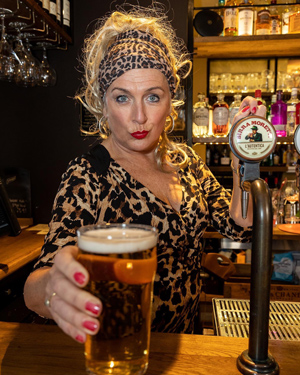 Can you discuss a particularly memorable or impactful moment from your comedy career related to your menopause material?
Can you discuss a particularly memorable or impactful moment from your comedy career related to your menopause material?
I will always remember performing at Leicester Comedy Festival and there were a group of heterosexual couples in the audience. At one point I could see the men leaning forward and it dawned on me. You feel alone too! It felt great to know the show had engaged with them as I was conscious of this when writing the show. I also managed to coin the term Menocom in the urban dictionary to describe comedy as a specific Menopause genre.
In what ways do you believe comedy can contribute to broader discussions and understanding of menopause in society?
When we laugh, a little door in our mind opens and we allow information to be taken on board we wouldn’t normally give access to. Comedy enables an audience to laugh out loud about taboos and once we laugh the taboo starts to lose authority. Whilst things we associate with, yet too embarrassed to talk about become more accessible. No matter how old you are that always feels good. To share a laugh about the same comedic situation draws us closer, we no longer feel alone. Menopause comedy can do this and should be a genre, just like the coming-of-age films we watch in our teens. Menopause comedy can educate and assure. Finally, there seems to be a more sophisticated understanding of menopause in entertainment. Thankfully we’ve moved on from the menopause being defined by a hot flush only. I was delighted to get the term Menocom into the Urban Dictionary; from the essay I wrote.
“Plot lines should not be limited to menopausal manifestations in the individual, but the impact of the menopause to her and those around her at that point in time. With an aim to raise awareness and educate as seen in the coming-of-age genre. Without a doubt, it’s a delicate balance of laughing with the menopause rather than at it. For if we can laugh with it, isn’t the risk and rewards far better than staying silent?”
How do you balance humour with raising awareness or providing insight into the experiences of women going through menopause?
For me it’s like a dance between the two, I find if I overthink the humour, it loses its comedy impact. So, when I write I will do it free flow and see what emerges. I will then edit purposely to drop in personal experiences or those presented by others. I’m currently writing the full version of Dolly’s Journal as a novel. In The Internal Mechanisms of a Menopausal Woman, I’ve continued to thread updated menopause research and audience response to Dolly’s perspective and daily life as a pub landlady. I try to work with a vision that will create a natural awareness without being dictatorial, with the hope that insight for the reader or viewer is as individual as their menopause. Over the last few years, the menopause landscape has become an exciting place as more people from all walks of life get involved in the conversation and continue to dilute menopause taboos.
For more information and to follow Debbie visit Menopause Party
Upcoming Menopause Party Shows
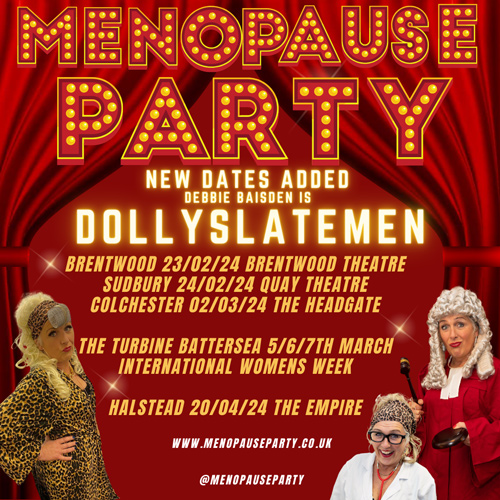
Read more inspiring women here.

